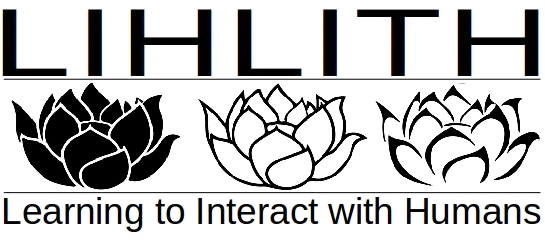LIHLITH - Learning to Interact with Humans by Lifelong Interaction with Humans

At a glance
- Project leader : Dr. Mark Cieliebak
- Project team : Jan Milan Deriu
- Project budget : CHF 218'340
- Project status : completed
- Funding partner : EU and other international programmes
- Contact person : Mark Cieliebak
Description
The LIHLITH project is a fundamental pilot research project which introduces a new lifelong learning framework for the interaction of humans and machines on specific domains. A Lifelong Learning system learns different tasks sequentially, over time, getting better at solving future related tasks based on past experience. LIHLITH will focus on human-computer dialogue, where each dialogue experience is used by the system to learn to better interact, based on the success (or failure) of previous interactions. The key insight is that the dialogue will be designed to produce a reward, allowing the chatbot system to know whether the interaction was successful or not. The reward will be used to train the domain and dialogue management modules of the chatbot, improving the performance, and reducing the development cost, both on a single target domain but specially when moving to new domains. The research will be evaluated on publicly available benchmarks to allow comparison with other approaches in the state of the art. When possible, systems will participate in international comparative/competitive evaluations such as WOCHAT or SemEval. LIHLITH project will also develop and deliver evaluation protocols and benchmarks to allow public comparison and reproducibility based on crowdsourcing. The industrial partner will transfer the research into technology, applying the lessons learnt to the development of chatbots for customer support. LIHLITH will rely on recent advance in multiple research disciplines, including, natural language processing, knowledge induction, reinforcement learning, deep learning, and lifelong learning.
Further information
Publications
-
Deriu, Jan Milan; Tuggener, Don; von Däniken, Pius; Campos, Jon Ander; Rodrigo, Alvaro; Belkacem, Thiziri; Soroa, Aitor; Agirre, Eneko; Cieliebak, Mark,
2020.
In:
Proceedings of the 2020 Conference on Empirical Methods in Natural Language Processing (EMNLP).
Conference on Empirical Methods in Natural Language Processing (EMNLP), Online, 16-20 November 2020.
Association for Computational Linguistics.
pp. 3971-3984.
Available from: https://doi.org/10.18653/v1/2020.emnlp-main.326
-
Deriu, Jan Milan; Mlynchyk, Katsiaryna; Schläpfer, Philippe; Rodrigo, Alvaro; von Grünigen, Dirk; Kaiser, Nicolas; Stockinger, Kurt; Agirre, Eneko; Cieliebak, Mark,
2020.
A methodology for creating question answering corpora using inverse data annotation [paper].
In:
Proceedings of the 58th Annual Meeting of the Association for Computational Linguistics.
58th Annual Meeting of the Association for Computational Linguistics (ACL 2020), online, 5-10 July 2020.
Association for Computational Linguistics.
pp. 897-911.
Available from: https://doi.org/10.18653/v1/2020.acl-main.84
-
Campos, Jon Ander; Otegi, Arantxa; Soroa, Aitor; Deriu, Jan Milan; Cieliebak, Mark; Agirre, Eneko,
2020.
DoQA : accessing domain-specific FAQs via conversational QA [paper].
In:
Proceedings of the 58th Annual Meeting of the Association for Computational Linguistics.
58th Annual Meeting of the Association for Computational Linguistics (ACL 2020), online, 5-10 July 2020.
Association for Computational Linguistics.
pp. 7302-7314.
Available from: https://doi.org/10.18653/v1/2020.acl-main.652
-
Deriu, Jan Milan; Rodrigo, Alvaro; Otegi, Arantxa; Echegoyen, Guillermo; Rosset, Sophie; Agirre, Eneko; Cieliebak, Mark,
2020.
Survey on evaluation methods for dialogue systems.
Artificial Intelligence Review.
54(1), pp. 755-810.
Available from: https://doi.org/10.1007/s10462-020-09866-x
-
Agirre, Eneko; Marchand, Sarah; Rosset, Sophie; Peñas, Anselmo; Cieliebak, Mark,
2018.
LIHLITH : improving communication skills of robots through lifelong learning.
ERCIM News.
2018(114), pp. 12.
Available from: https://ercim-news.ercim.eu/images/stories/EN114/EN114-web.pdf